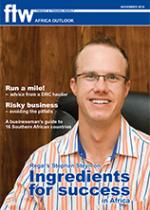Time, they say, waits for no man
– that is except in Africa where
many will find patience to truly
be a virtue.
Patience, patience and more
patience, says Stephan Steyn,
managing member of Regal Fruits
and Hanspack, is what makes the
difference when exporting in Africa.
And this 31-year-old
Johannesburg-based businessman
should know. Having exported to
more than 17 African countries,
understanding this often-complex
market is key to success.
“We currently export monthly
to 11 countries in Africa, but we
are continuously heading into new
markets and opportunities. Our
growth the past few years has been
superb, and we want to build on
that and establish ourselves as the
supplier of choice for Africa, by
Africa.”
Regal Fruits, a supplier of
ingredients, equipment, packaging
and technology to small and medium
scale dairy and juice processing
farmers in Africa, first launched
in 2005 when it combined offices
and infrastructure with Hanspack,
a plastic bottle manufacturing
company that has been successfully
exporting in Africa since its
inception in 1997.
“We penetrated the export market
immediately after our launch in
2005,” says Steyn. “It was not easy
at first as it was difficult to get
customers used to new products, but
through perseverance and patience
it was possible to grow the business
into what it is today.”
Having grown up on a dairy farm
in the Eastern Transvaal, Steyn
never thought he would be exporting
to Africa. In fact, it was a career
in tourism that he envisioned for
himself. Having spent many school
holidays working for his father it
seemed a good idea to take up a job
offer to pay back student fees in
2001.
“My father had sold the dairy
and subsequently started a service
company to dairies and also a
marketing company for various
ingredient companies that didn’t
have the infrastructure to deal with
smaller dairies. My mother was
working as the financial manager
and my brother as the operations
manager, so it made sense for me to
pay back my study debt before going
into tourism – but fate took over and
led me down another path.”
An accident in April 2001 changed
Steyn’s life forever. “My father was
always responsible for the customer
training, factory commissioning,
technical backup and service, but
on his way back from a customer
in 2001 he was involved in a
serious car accident, which left
him a quadriplegic. My role in the
company changed overnight as I
was given the opportunity to be
immediately trained into my father’s
position.”
A mere three months later Steyn
found himself in Libreville, Gabon
installing, commissioning and
training at a factory.
“I was really thrown in at the
deep end, but luckily had a fantastic
support system in my family and
suppliers to pull me through.”
Steyn says he has learnt many lessons since then and strongly
believes in Africa’s potential. The
company, whose biggest markets
are in Zimbabwe, the Democratic
Republic of the Congo and
Mozambique, exports not only for
profit.”
“For us it is imperative to export,”
says Steyn. “South Africa has so
much knowledge and expertise that
it would be wrong not to share it
with Africa. We compete in quality
with Europe in our product supply
and our pricing is competitive.
But more than that, we have an
understanding of African conditions.
Our equipment is therefore also built
for African conditions and we do not
reply on cheap Eastern imports.”
Steyn says individuality is key in
the African market. “You have to
be able to adapt your products and
product supply and give individual
care to each customer. Doing
business in Africa is much more
about personal relations, than just
supplying products.”
The continent, without doubt,
offers challenges, such as pricing
and payments. “Sometimes
customers want invoicing in ZAR
and other times in USD, so it can
be challenging, but if you have the
ability to adapt while not losing
your competitiveness, you will be
successful.
With growth in nearly every
market segment, Africa offers
ample opportunity. “There is a lot
of investment in food production
and basic food supply. Foodstuffs
are usually imported at high costs
and local companies can compete by
manufacturing good quality products
for the masses. But anyone wanting
to take on the African market must
have patience, lots of patience,”
advises Steyn. “No decision is made
fast, but once a decision is made it is
usually good and means long-term
business.”
And never forget logistics – a
factor that can prove to be very
challenging not just because of
the infrequent shipping to some
destinations, but also because of lack
of infrastructure such as roads and
communication.
“Africa has some great
opportunities and there is a lot of
cash available in the markets. The
informal market segment is big
and if your customer has a foot in,
business opportunities are superb,”
says Steyn. “But there are aspects
that one must be able to deal with
such as expensive airfreight charges,
especially to countries that are
landlocked like Uganda. In East
Africa we are having to deal with a
lot of cheap imports from India and
China. This makes South Africa a
bit uncompetitive, but they cannot
compete on our quality.”
He believes that service excellence
makes all the difference in the end.
“If you don’t keep the customer
happy with your service levels you
will lose him. This means that even
though you might be higher priced
than competitors, if you are reliable
they will support you.”
In the process of tendering
for a new facility in Luanda and
expanding a customer’s production
site in the DRC, Regal Fruits has, no
doubt, taken the African continent
by storm.
Success in Africa is all about patience
03 Dec 2010 - by Liesl Venter
0 Comments
Africa Outlook 2010

03 Dec 2010
03 Dec 2010
03 Dec 2010
03 Dec 2010
03 Dec 2010
03 Dec 2010
03 Dec 2010
Border Beat
Poll
Featured Jobs
New
New
